The inexorable march of the powers of the EU Empire over citizens
How the EU has seized power by patience and stealth
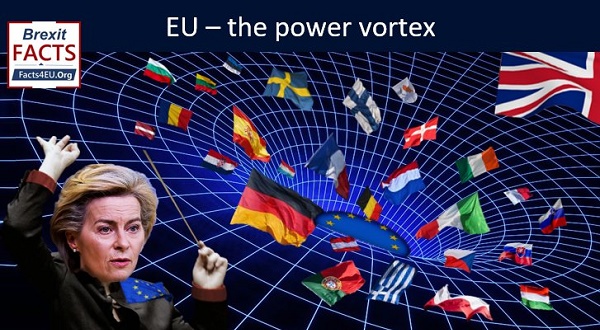
Montage Facts4EU.Org 2021
Facts4EU.Org summarises how independent countries have been sucked into the EU vortex
A Brexit Facts4EU.Org Series
Part One – The EU’s acquisition of countries, land, and people
Part Two – The EU’s acquisition of political and other powers (this report)
Part Three – The EU’s empire compared to the last Western European empire: the Third Reich (coming soon)
In Part One of this three-part series we focused on the enormous increase in the EU's orbit in terms of countries, territory, and people. In less than 50 years since its first enlargement (when the EU was called the European Economic Community or EEC) we showed that:
- The number of EU countries is now 4.5 times greater
- The amount of EU territory is now 3.5 times greater
- The number of people living under the EU is now 2.85 times greater
- And how the EU’s territorial control is set to grow still further
© Brexit Facts4EU.Org (using mapchart.net) - click to enlarge
The steady march of the powers of the EU Empire
In this, Part Two, Facts4EU.Org looks at the EU’s acquisition of political and other powers over the citizens in its empire.
As a reminder, the United Kingdom joined the EU – then the ‘European Economic Community’ (EEC or Common Market) - on 01 Jan 1973. A referendum on whether to stay in was not held until two years later. The Republic of Ireland and Denmark joined at the same time. In the RoI’s case, and to an extent in Denmark’s case, it had little choice as its economy was so closely tied to that of the UK.
In our potted history below we will often simply refer to ‘the EU’, regardless of what it called itself at the time.
1957-1973 – Brussels starts stretching its claws
From its first inception in 1957, Brussels started to stretch its claws. From being a trading bloc it took on new powers, starting with legislating on environmental controls.
From March 1958 the EU had the ‘European Parliamentary Assembly’, which became the ‘European Parliament’ on 30 March 1962. Until July 1978 the Parliament was filled by appointed delegates but an Act then came into force and MEPs started to be elected by popular mandate the following year. Then – as now – this Parliament had no powers to introduce new laws. These power were – and still are – held by the EU Commission which is not elected by the people.
1970 – The illegal seizure of fishing rights
In 1970, on the UK’s application to join, the EU hastily made a new law that all fishing rights of member states would be shared. The reason was simple: the richest waters in Europe were those around the UK. By rushing through a new law the EU guaranteed that the UK would cede its waters on the day it joined. There was no legal justification in the Treaty for this power grab but the EU went ahead and did it anyway.
1973 – The UK’s accession to the ‘Common Market’
"There are some in this country who fear that in going into Europe we shall in some way sacrifice independence and sovereignty. These fears, I need hardly say, are completely unjustified."
- Prime Minister Ted Heath, TV broadcast to the nation, on Britain's entry into the Common Market, Jan 1973
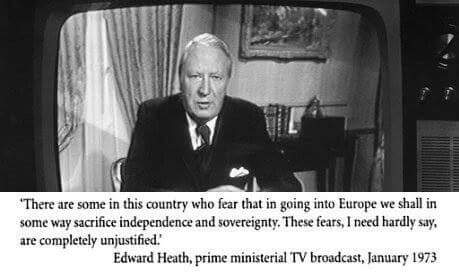
We now know from official papers which were released under the 30-year rule that for years Ted Heath lied to Parliament and to the British people. He knew full well that the Act of Accession would automatically cede independence and sovereignty to Brussels.
Even back in 1973, the mere act of joining the ‘Common Market’ meant signing up to an ever closer union. Heath was told in writing by his civil servants that accession would involve “a process of fundamental political importance, implying progressive development towards a political union”. The Civil Service also made clear that the long-term objectives of the forerunner of the EU went “well beyond the full establishment of a Common Market”.
Reviewing the EU’s plans at that time, the Civil Service and in particular the Foreign and Commonwealth Office advised Heath that these would lead to:
“The ultimate creation of a European federal state, with a single currency. All the basic instruments of national economic management (fiscal, monetary, incomes and regional policies) would ultimately be handed over to the central federal authorities.”
- Source: Public Records Office/FCO 30/789
The reaction of both the pro-EEC/EU Civil Service and the Government was that it would probably be best to keep these facts secret from the British public. This is very well documented in the official papers and cannot be disputed.
1987 – The Single European Act
At the risk of stating the obvious, the clue was in the name. It led to a name change a few years later to “the European Community”, the ‘economic’ part of the title being dropped. This Act was transformational in many ways and it even made the direction of travel even clearer:
“establishing the European Communities and to transform relations as a whole among their States into a European Union”
- Single European Act 1987
Symbolically – and very importantly - this Act introduced an EU flag and a (German-composed) EU anthem for the first time. On the road to becoming a single superstate, absorbing powers and identity from its member countries, this was a very significant milestone for Brussels.
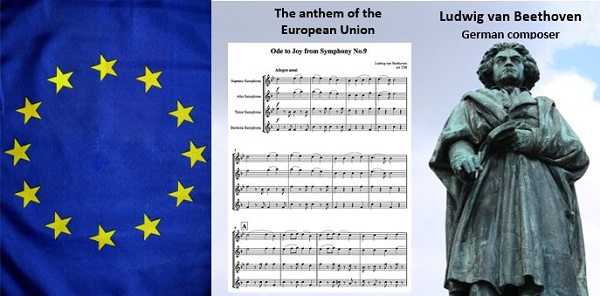
Montage: Brexit Facts4EU.Org
This Act also introduced the principle of Qualified Majority Voting (QMV) in certain areas of policy. Another way of putting this is that it removed the automatic right of veto by member countries. In subsequent decades the use of QMV has been extended to more areas of policy, which of course was always envisaged in Brussels.
1993-2009 – The Maastricht Treaty and its successors
Maastricht was the birth of the European Union in terms of its official name. The flag and anthem had been agreed and now the new ‘country-in-the-making’ had decided on a name.
The Maastricht Treaty was key. It laid the foundations for a shared European citizenship, for the eventual introduction of a single currency, and for common foreign and security policies. It also presaged the treaties which followed, which introduced more and more powers and controls on the way to its Empire status. These include the Treaty of Amsterdam (1999), the Treaty of Nice (2003), and the Lisbon Treaty (2009).
The new ‘Schengen agreement’ then opened the doors for free movement without passports across the EU. In order to create one superstate it is important that borders be eliminated. Schengen represented the start of this process of borderless, supposedly separate and sovereign countries.
2010-2020 - The new EU countries have kept taking the UK's subsidies - why wouldn't they?
When the EU enlarged again in 2004 and subsequently, every single new member country has been a net recipient of 'EU funding'. In reality this was of course part-financed by the UK being a net contributor to the EU's coffers for every year of its membership bar the first. In the early years of their membership these countries more or less accepted the increasing powers of the EU. Now, some of these countries are facing the prospect of being net contributors to the EU's budget, which is a process likely to accelerate as very poor Balkan countries queue up to join.
We are already seeing pushbacks against the EU's increasing powers from countries such as Poland and Hungary. When more countries no longer receive subsidies for being members, the conflicts between member countries and the EU machine are only likely to escalate.
2021 - So what powers does the EU have now?
Now we jump to the present day. As so often, we will let the EU Commission itself tell readers what it can now do.
“The Commission is the EU institution that has the monopoly on legislative initiative and important executive powers in policies such as competition and external trade. It is the principal executive body of the European Union and is formed by a College of members composed of one Commissioner per Member State. The Commission oversees the application of Union law and respect for the Treaties by the Member States; it also chairs the committees responsible for the implementation of EU law. The former comitology system has been replaced by new legal instruments, namely implementing and delegated acts.”
- EU Commission website 2021
In short, the unelected EU Commission now has most of the powers that the founders dreamt of and planned for from the very beginning. For those in any doubt, here is some more from the EU Commission:-
“The Commission has a Secretariat-General consisting of 33 directorates-general, which develop, manage and implement EU policy, law and funding. In addition, there are also 20 special departments (services and agencies), which deal with ad hoc or horizontal issues. …There are also six executive agencies, such as the Research Executive Agency, which perform tasks delegated to them by the Commission but which have their own legal personality. Barring a few exceptions, the Commission acts by a majority of its members (Article 250 TFEU).”
- EU Commission website 2021
It is important to stress that the EU Commission is not the same as the British Civil Service, as so many Remainer-Rejoiners seem to believe. The Commission’s powers go far beyond this, and yet not one of the Commissioners is elected by popular mandate.
Even its current President, Ursula von der Leyen, was a last-minute compromise candidate who was shoe-horned in at the last minute, despite the protests from the EU Parliament. She was the only candidate allowed in this sham 'election' and yet she only managed to get approved by just eight votes.

Our report above was given excellent coverage in an article in the Daily Express today.
© Express Newspapers / Reach PLC - click to read
Observations
Facts4EU.Org could write a book on the subject of the EU and its power grabs. Above we have tried to summarise some of the developments in a readable way.
The EU now has supreme power over large parts of everyday life for citizens in the EU, from deciding that your vacuum cleaner can only clean at half the suction you were used to, to deciding what you can eat, to deciding what social policies your own government can pursue. There is now scarcely any aspect of life which is untouched by the EU’s powers.
Is the continual acquisition of increasing powers by Brussels benign?
Unfortunately, after six years of intensely studying the EU on a seven day-a-week basis, we do not believe it is.
On the day after the majority of the British public voted to leave this sclerotic empire, the EU Commission President stated: “This is not an amicable divorce.” Given that he said this within hours of the result having been declared, this was clearly a statement of hostile intent and this is exactly how the EU has behaved ever since – with hostility. We suggest it epitomises the nature of this now-powerful beast.
Facts4EU.Org and you
Most of our readers are well-informed and appreciate our fact-based articles, presented in a way you won't see anywhere else. If you value reports like the one above - and the further two parts to come - please help our work with a donation. We have far more to do in researching, publishing, campaigning and lobbying Parliament than we have in terms of the financial resources to fulfil these tasks. We badly need funding to continue - we rely 100% on public donations from readers like you. We are a 'not for profit' team (we make a loss) and any donation goes towards the actual work, not plush London offices, lunch or taxi expenses, or other luxuries of some organisations. Nor do we ask you for further donations if you donate once - we just hope that you keep supporting us. Your donation stays anonymous unless you tell us otherwise.
If you believe in a fully-free, independent, and sovereign United Kingdom, please make a donation now. It’s quick, secure, and confidential, and you can use one of the links below or you can use our Donations page here. You will receive a personal, friendly ‘thank you’ from a member of our team within 24 hours. Thank you for reading this.
[ Sources: EU Commission | EU Parliament | Public Records Office | Bruges Group ] Politicians and journalists can contact us for details, as ever.
Brexit Facts4EU.Org, Tues 03 Aug 2021
Click here to go to our news headlines
Please scroll down to COMMENT on the above article.
And don't forget to actually post your message after you have previewed it!
Since before the EU Referendum, Brexit Facts4EU.Org
has been the most prolific researcher and publisher of Brexit facts in the world.
Supported by MPs, MEPs, & other groups, our work has impact.
We think facts matter. Please donate today, so that we can continue to ensure a clean Brexit is finally delivered.
Paypal Users Only - Choose amount first
Quick One-off
Monthly
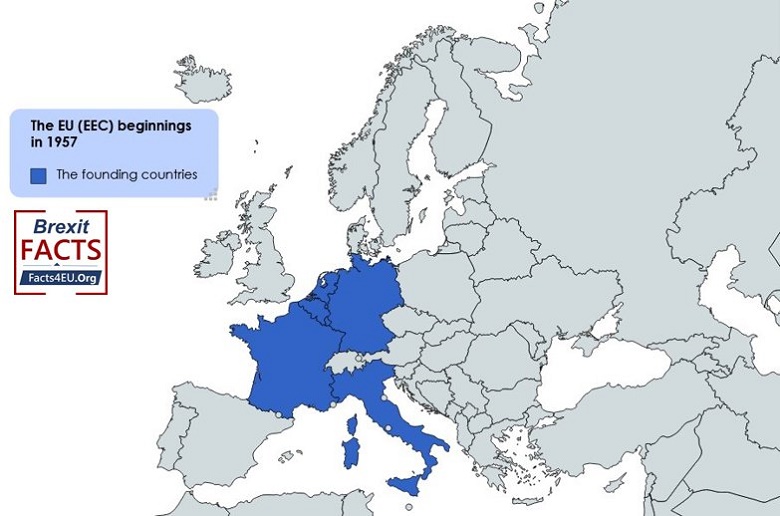
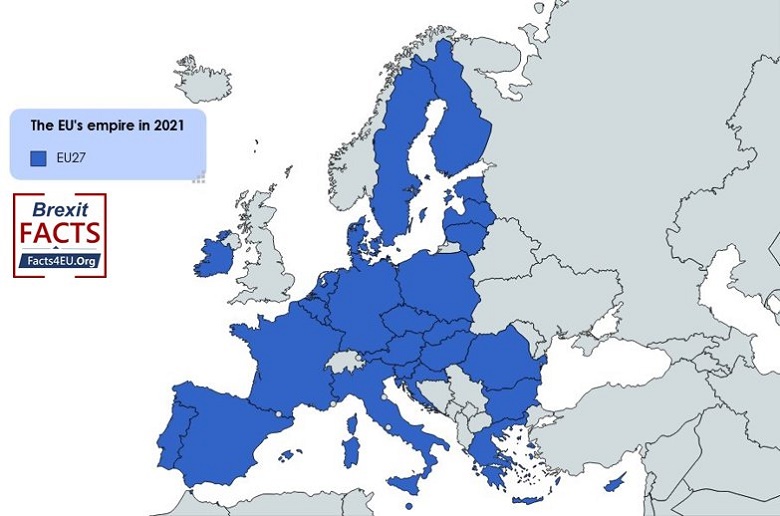
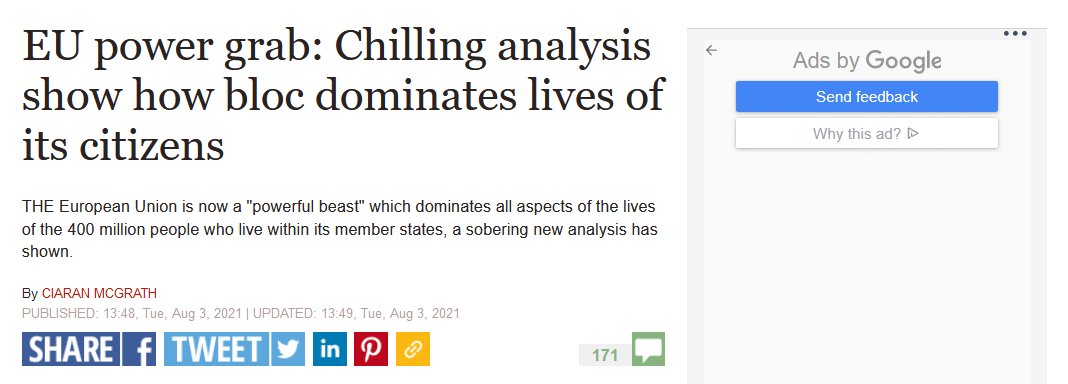


Something to say about this? Scroll down for reader comments